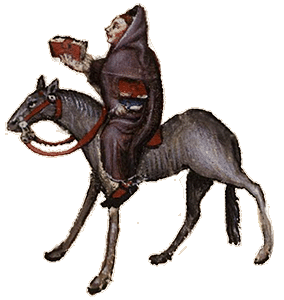|
|
|
|
 |
to Chaucer's Clerk |



A CLERK ther was of Oxenford also,
That unto logyk haddė longe y-go.
As leenė was his hors as is a rake,
And he nas nat right fat I undertake,
But lookėd holwe and ther-to sobrely;
Ful thredbare was his overeste courtepy;
For he hadde geten hym yet no benefice,
Ne was so worldly for to have office;
For hym was levere have at his beddes heed
Tw&eaccute;nty bookės, clad in blak or reed,
Of Aristotle and his philosophie,
Than robės riche, or fithele, or gay sautrie:
But al be that he was a philosophre,
Yet haddė he but litel gold in cofre;
But al that he myghte of his freendės hente
On bookės and his lernynge he it spente,
And bisily gan for the soulės preye
Of hem that yaf hym wher-with to scoleye.
Of studie took he moost cure and moost heede,
Noght o word spak he moorė than was neede,
And that was seyd in forme and reverence,
And short and quyk and ful of hy senténce.
Sownynge in moral vertu was his speche
And gladly wolde he lerne and gladly teche.
|
285
290
295
300
305
|
[AJ Notes:]
285. Oxenford, Oxford.
286. unto logyk haddė longe y-go, that had long studied Logic, the main subject
in the Arts course at Medieval universities.
289. holwe, hollow; gaunt.
290. overeste, uppermost.
courtepy, short jacket.
291. benefice, a permanent church appointment, like of a parson.
292. Ne was so worldly...office, was not well-versed enough in non-clerical matters,
such as commerce, as to secure a secular position.
293. hym was levere, he would rather.
296. fithele, fiddle, violin.
sautrie, psaltery, a stringed instrument.
297. philosophre, philosopher; alchemists, who tried to turn base metals into gold,
and sought to create the Philosopher's Stone (which would grant immortality),
were also called philosophers.
298. coffre, coffers.
299. hente, get.
302. wher-with to scoleye, wherewithal (means) to do his scholarship.
303. cure, care.
305. forme, formality.
306. senténce, wisdom; edifying subject matter; moral teaching.
307. Sownynge, resounding.
Source:
Pollard, Alfred W., ed. Chaucer's Canterbury Tales. Vol I.
London: Macmillan and Co., Ltd., 1903. 11.
 | to Chaucer's Clerk
|

|
to the Canterbury Tales
|
 |
to the Works of Geoffrey Chaucer |
Copyright ©1996-2023 Anniina Jokinen. All Rights Reserved.
Created by Anniina Jokinen on February 7, 2023.
|
|
|